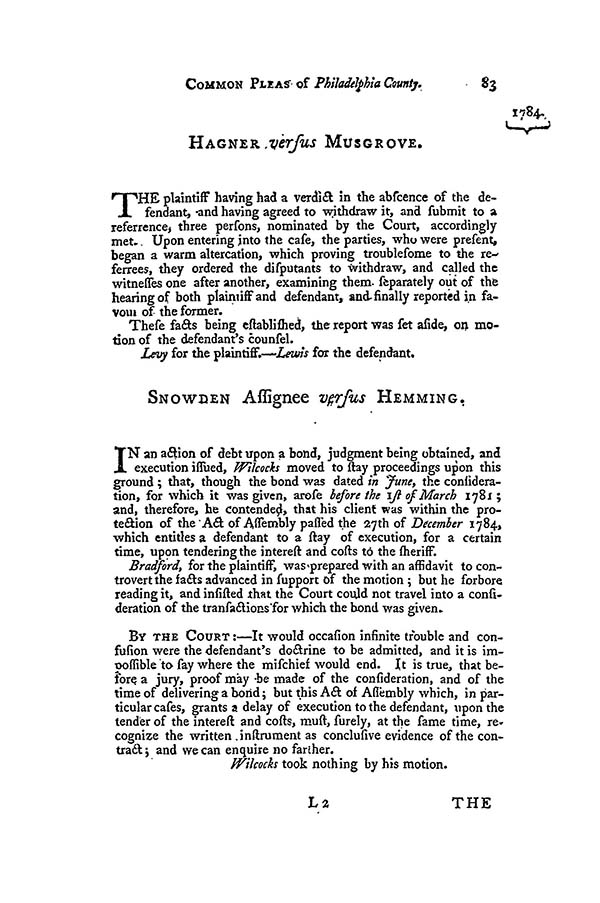Hagner v. Musgrove, 1. Dall. 83 (C.P. Phila. Cty. 1784) and Snowden v. Hemming, 1. Dall. 83 (C.P. Phila. Cty. 1784)
Common Pleas, Philadelphia County.
June Term, 1784.
Hagner versus Musgrove.
The plaintiff having had a verdict in the abscence of the defendant, and having agreed to withdraw it, and submit to a referrence, three persons, nominated by the Court, accordingly met. Upon entering into the cafe, the parties, who were present, began a warm altercation, which proving troublesome to the referrees, they ordered the disputants to withdraw, and called the witnesses one after another, examining them separately out of the hearing of both plaintiff defendant, and finally reported in favour of the former.
These facts being established, the report was set aside, on motion of the defendant's counsel.
Levy for the plaintiff.—Lewis for the defendant.
Hagner v. Musgrove, 1 U.S. 83, 1. Dall. 83 (C.P. Phila. Cty. 1784)
Snowden Assignee versus Hemming.
In an action of debt upon a bond, judgment being obtained, and execution issued, Wilcocks moved to stay proceedings upon this ground; that, though the bond was dated in June, the consideration, for which it was given, arose before the 1st of March 1781; and, therefore, he contended, that his client was within the protection of the Act of Assembly passed the 27th of December 1784, which entitles a defendant to a stay of execution, for a certain time, upon tendering the interest and costs to the sheriff.
Bradford, for the plaintiff, was prepared with an affidavit to controvert the facts advanced in support of the motion; but he forbore reading it, and insisted that the Court could not travel into a confideration of the transactions for which the bond was given.
by the court:—It would occasion infinite trouble and confusion were the defendant's doctrine to be admitted, and it is impossible to say where the mischief would end. It is true, that before a jury, proof may be made of the consideration, and of the time of delivering a bond ; but this Act of Assembly which, in particular cases, grants a delay of execution to the defendant, upon the tender of the interest and costs, must, surely, at the same time, recognize the written instrument as conclusive evidence of the contract; and we can enquire no farther.
Wilcocks took nothing by his motion.
Snowden Assignee v. Hemming, 1 U.S. 83, 1. Dall. 83 (C.P. Phila. Cty. 1784)

Last modified: December 11, 2014